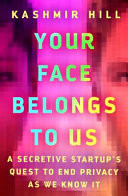Your Face Belongs to Us: A Secretive Startup's Quest to End Privacy as We Know It | Kashmir Hill
The story of a small AI company that gave facial recognition to law enforcement, billionaires, and businesses, threatening to end privacy as we know it �The dystopian future portrayed in some science-fiction movies is already upon us. Kashmir Hill�s fascinating book brings home the scary implications of this new reality.��John Carreyrou, author of Bad Blood Longlisted for the Financial Times and Schroders Business Book of the Year Award New York Times tech reporter Kashmir Hill was skeptical when she got a tip about a mysterious app called Clearview AI that claimed it could, with 99 percent accuracy, identify anyone based on just one snapshot of their face. The app could supposedly scan a face and, in just seconds, surface every detail of a person�s online life: their name, social media profiles, friends and family members, home address, and photos that they might not have even known existed. If it was everything it claimed to be, it would be the ultimate surveillance tool, and it would open the door to everything from stalking to totalitarian state control. Could it be true? In this riveting account, Hill tracks the improbable rise of Clearview AI, helmed by Hoan Ton-That, an Australian computer engineer, and Richard Schwartz, a former Rudy Giuliani advisor, and its astounding collection of billions of faces from the internet. The company was boosted by a cast of controversial characters, including conservative provocateur Charles C. Johnson and billionaire Donald Trump backer Peter Thiel�who all seemed eager to release this society-altering technology on the public. Google and Facebook decided that a tool to identify strangers was too radical to release, but Clearview forged ahead, sharing the app with private investors, pitching it to businesses, and offering it to thousands of law enforcement agencies around the world. Facial recognition technology has been quietly growing more powerful for decades. This technology has already been used in wrongful arrests in the United States. Unregulated, it could expand the reach of policing, as it has in China and Russia, to a terrifying, dystopian level. Your Face Belongs to Us is a gripping true story about the rise of a technological superpower and an urgent warning that, in the absence of vigilance and government regulation, Clearview AI is one of many new technologies that challenge what Supreme Court Justice Louis Brandeis once called �the right to be let alone.�




















